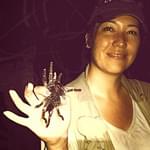Event Recording:
Although often neglected and poorly documented, invertebrate trade is big business.
Their illegal trade is considered to be a serious but many times overlooked threat to their populations, particularly in range-restricted species that have attracted international demand such as many species of tarantulas.
Currently, Convention on International Trade in Endangered Species lists only 36 spider species. However, this is just the tip of the iceberg: the numbers of taxa and specimens traded across the world are a gross underestimation of what is traded. The demand for tarantulas as pets at a global level is high and increasing.
Even though their trafficking is an important driver of biodiversity loss, spiders and other arachnids have low priority for enforcement authorities or policy-makers. Thus, it is necessary to create alternatives to the traditional way of dealing with illegal and unsustainable arachnid trade, focusing more on the consumer’s demand and behaviour.
This is a joint event with the Oxford Martin Programme on the Illegal Wildlife Trade

Dr Caroline Sayuri Fukushima
Oxford Martin Visiting Fellow, Oxford Martin Programme on Wildlife Trade
Caroline is a Postdoc Researcher at the Finnish Museum of Natural History, University of Helsinki / LIBRe, Finland.
Carol has been working with evolution, taxonomy, ecology, natural history, and behaviour of arachnids since she was an undergrad student in Brazil. In LIBRe, Carol’s research focused on the wildlife trade, especially in characterising the trade of live tarantulas and the impact of this trade on wild populations. She is interested in understanding the drives of the tarantula pet market and in proposing different approaches to curb the illegal and unsustainable wildlife trade.
She is a member of the SWA, Support Women in Arachnology, a group that support female arachnologists and study the biases in arachnological research, and member of the IUCN Spider and Scorpion Specialist Group.
Keep in touch
If you found this page useful, sign up to our monthly digest of the latest news and events
Subscribe